American and European businesses strengthen ties and pursue win-win cooperation with their Chinese counterparts at the 8th CIIE.
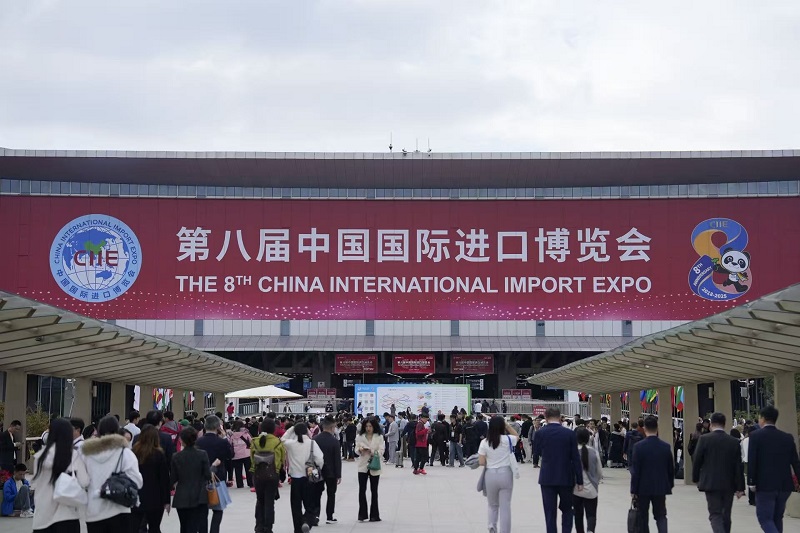
The National Exhibition and Convention Center, main venue for the 8th China International Import Expo (CIIE) in east China’s Shanghai, on November 5, 2025. Huang Yuhao
China will continue to seek high-quality growth and unswervingly promote high-standard opening-up, making new contributions to the world economy. Chinese Premier Li Qiang reaffirmed this commitment at the opening ceremony of the 8th China International Import Expo (CIIE) and the Hongqiao International Economic Forum in Shanghai on November 5, 2025.
With 4,108 overseas exhibitors from 155 countries, regions, and international organizations, the 8th CIIE highlights China’s determination to expand openness and its enduring appeal to global businesses amid rising trade protectionism. “This year’s CIIE saw a record high number of participating enterprises, fully demonstrating the vitality of China’s super-large market,” said Li.
China-U.S. Cooperation
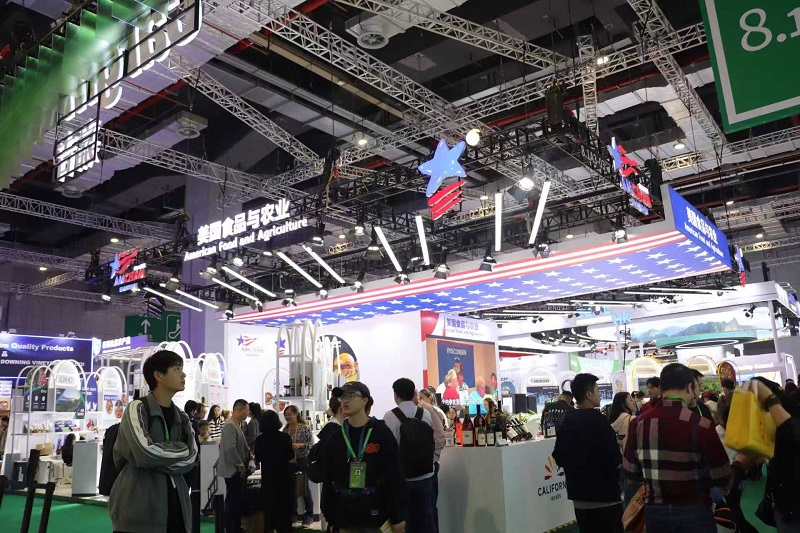
The American Food and Agriculture Pavilion at the 8th China International Import Expo (CIIE) in east China’s Shanghai on November 9, 2025. Hu Fan
Founded 110 years ago, the American Chamber of Commerce in Shanghai (AmCham Shanghai) has long been hailed as “the voice of American businesses in China.” At this year’s CIIE, the chamber partnered with the U.S. Department of Agriculture to host the American Food and Agriculture Pavilion for the third consecutive time. Featuring 19 exhibitors, it represented the largest U.S. agricultural and food presence at the expo.
Eric Zheng, president of AmCham Shanghai, believes agricultural trade is vital to both countries. “The U.S. is one of the largest exporters of agricultural products, and China is one of the largest importers of agricultural products, such as soybeans. So, they’re very complementary to each other,” he told China Today.
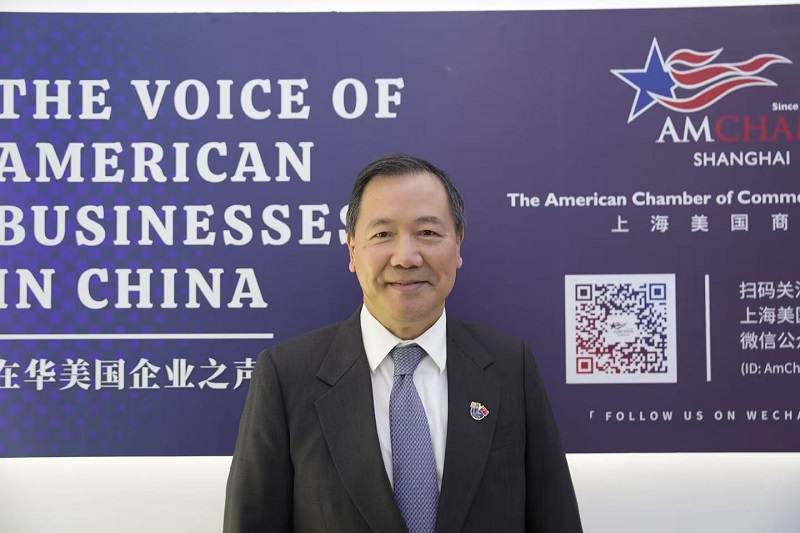
Eric Zheng, president of the American Chamber of Commerce in Shanghai (AmCham Shanghai), in an interview with China Today during the 8th China International Import Expo (CIIE) in east China’s Shanghai on November 7. Huang Yuhao
Many U.S. businesses at the expo expressed their confidence in the Chinese market. Christopher Beros, director of Greater China and Southeast Asia at the California Wine Institute, said his organization remains deeply committed to China. “CIIE is a very important platform for branding, for showing people that California wines are committed to the Chinese market,” he said.
Beros noted that many member wineries see China as a vital and fast-growing market with huge potential, as local consumers are increasingly exploring fine wines. He added that the rise of high-quality Chinese wines is a positive development that will “expand the number of consumers who want to drink fine wine,” benefiting the entire category rather than creating competition.
Kirk Baumann, president of a Wisconsin-based ginseng company, is also optimistic. With recent regulatory changes allowing ginseng to be sold as a food in China, he sees great potential purchasing power among the country’s 1.4 billion people, particularly its expanding middle class.
Baumann noted that about 90 percent of Wisconsin-grown ginseng already finds its way to China in some form, reflecting strong and long-standing demand. He said his company aims to deepen its direct presence in the Chinese market by building partnerships with local distributors and showing the health benefits of Wisconsin ginseng, which has long been regarded by Chinese consumers as the “gold standard.”
According to AmCham Shanghai, both the size and number of exhibitors at the American pavilion increased by 46 percent compared with 2024. Small and medium-sized American enterprises (SMEs) signed trade agreements worth nearly US $12 million, marking a 5 percent year-on-year rise. These figures not only highlight the solid outcomes of China–U.S. cooperation but also reflect the strong confidence of U.S. companies in the Chinese market.
Zheng noted that American companies continue to view China as a vital market thanks to its vast scale and strong manufacturing base, while endeavoring to ensure sustainable growth.
China-Europe Cooperation Gains Momentum
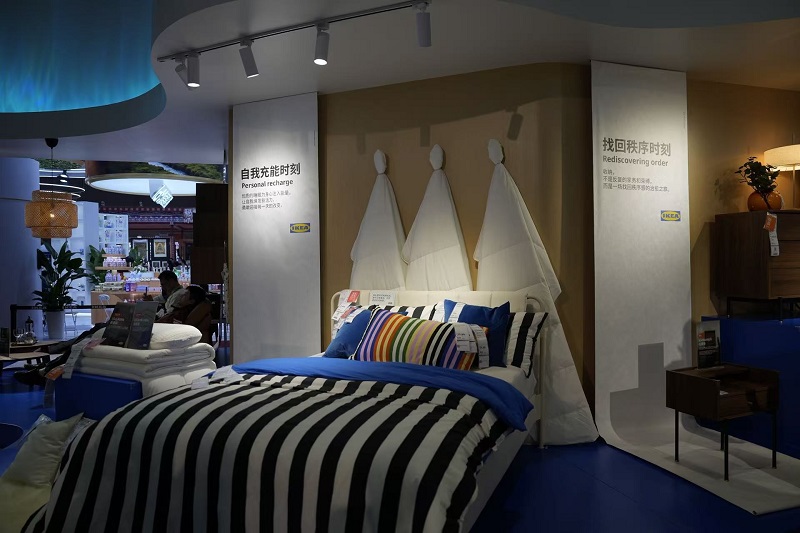
A corner of IKEA’s booth at the 8th China International Import Expo (CIIE) in east China’s Shanghai on November 7, 2025. Huang Yuhao
Cooperation between China and Europe is gaining sustained momentum at the CIIE, with Malta’s bluefin tuna industry providing a notable example. The country’s bluefin tuna made its debut at the 6th CIIE, drawing widespread attention and subsequently gaining approval to enter the Chinese market. Since then, exports of Maltese bluefin tuna to China have steadily increased.
Anton Refalo, Malta’s minister for agriculture, fisheries, and animal rights, told China Today at the 8th CIIE that between 2023 and 2025, about 190 tons of bluefin tuna were exported to China. Previously, around 95 percent of Maltese bluefin tuna had gone to Japan, so access to the Chinese market marks an important step in diversifying the country’s export destinations.
“It means very much to our fishermen,” the minister said, emphasizing the importance of entering the Chinese market. He expressed optimism about the future of bilateral cooperation. “I think there are many areas in which we can cooperate. Let’s hope we continue the spirit of friendship. I am sure that Maltese and Chinese people will cooperate for the better future of our people.”
Among them, the Swedish home furnishing giant IKEA stands out as a vivid example. The company has used the CIIE not only to launch new products but also to deepen its connection with Chinese consumers and strengthen cooperation with local partners. As Pontus Erntell, CEO of IKEA China, stressed, travelling to China is like travelling into the future.
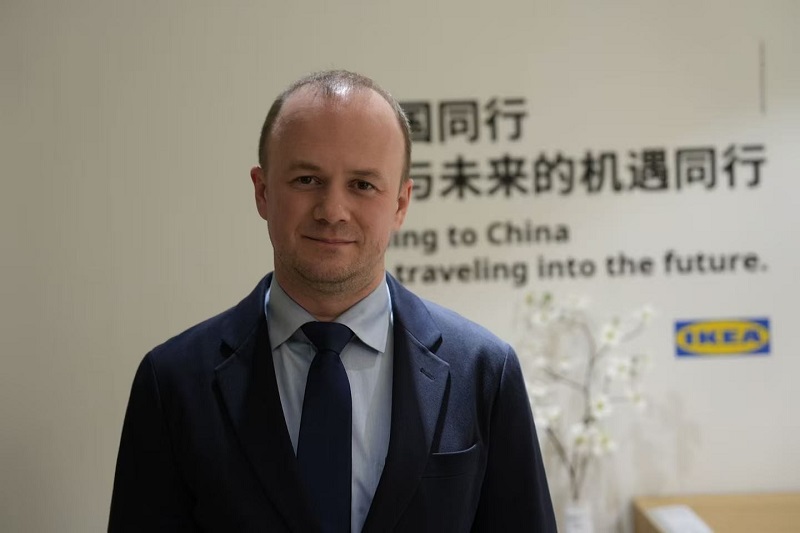
Aleksey Efremov, senior vice president of IKEA China, in an interview with China Today during the 8th China International Import Expo (CIIE) in east China’s Shanghai on November 7, 2025. Huang Yuhao
According to IKEA, its electric sofa RULLERUM, first unveiled at the CIIE in 2022, has sold approximately 78,000 units to date. In the 2025 fiscal year, it contributed nearly 50,000 units, accounting for 26.96 percent of the total sales revenue of the company’s sofa category, making it the top-selling product in that category.
In 2024, IKEA’s global debut of the FÖSSTA series, celebrating the Year of the Snake, also drew an enthusiastic response, with total sales reaching 400,000 pieces. Building on this success, the company is unveiling its new FÖSSTA collection for the upcoming 2026 Chinese Year of the Horse at this year’s CIIE. Developed in collaboration with folk culture experts and intangible cultural heritage inheritors from Xi’an, the collection features creative designs inspired by the spirit and symbolism of the horse.
IKEA is capitalizing on the development opportunities emerging from China’s deepening high-standard opening-up. The company has found fertile ground to strengthen its local presence. Aleksey Efremov, senior vice president of IKEA China, told China Today that today it operates an integrated ecosystem encompassing production, product development, and retail, laying a solid foundation for future growth under China’s open economy. “With China’s openness, we are happy to have a full-scale value chain here,” he said.
China’s green transition is also generating new momentum for IKEA’s sustainable journey. “Sustainability is at the heart of our operations,” said Efremov. Since its debut at last year’s CIIE, IKEA’s BuyBack and Resell program has collected nearly 3,500 pieces of furniture from consumers in the fiscal year 2025, including wardrobes, bed frames, and sofas. With a resale rate as high as 91 percent, the initiative exemplifies how IKEA and Chinese consumers are jointly embracing circular living.
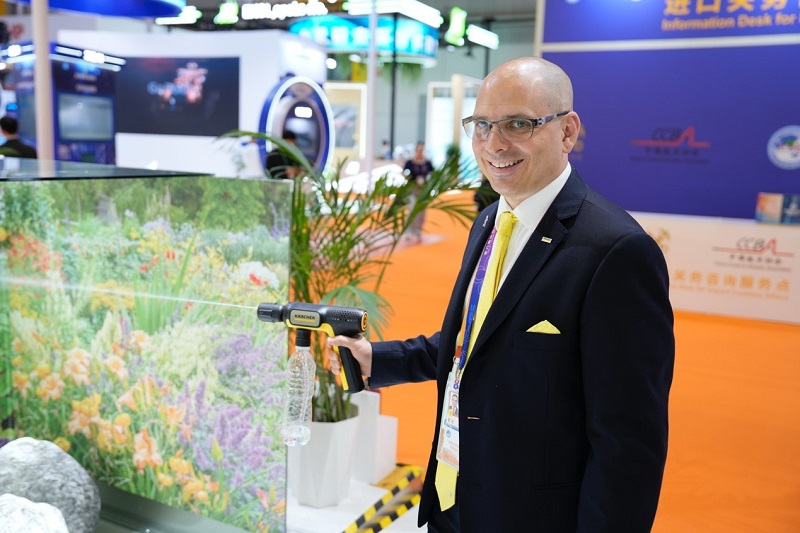
Rainer Kern, vice president of the Kärcher Group and CFO of Kärcher China, is demonstrating Kärcher’s product during the 8th China International Import Expo (CIIE) in east China’s Shanghai on November 5, 2025. Huang Yuhao
The German cleaning technology pioneer Kärcher offers another vivid example of how European companies are leveraging the CIIE to introduce their latest innovations to the Chinese market. At this year’s expo, the company unveiled seven new smart cleaning products, including the KHB Air handheld pressure washer, whose first version made its debut at last year’s CIIE.
“Last year, we sold more than 50,000 units in China,” said Rainer Kern, vice president of the Kärcher Group and CFO of Kärcher China. “It’s one of our biggest sellers volume-wise.” Loved by Chinese consumers for its portability and ease of use, the upgraded model is launched at this year’s expo.
As Kern observed, China’s fast-paced market and young, tech-savvy consumers provide an ideal environment for innovation. This dynamic ecosystem enables Kärcher to develop and test new product features with remarkable speed, turning ideas into reality far faster than in other markets. Such agility, he emphasized, gives the company a competitive edge in launching and refining products that meet the rapidly evolving demands of Chinese consumers. “Kärcher is very proud to be part of China’s growth story,” Kern said.
According to the World Openness Report 2025 released during the 8th Hongqiao International Economic Forum, China’s openness index rose to 0.7634 in 2024, up from 0.5891 in 1990, ranking it among the world’s most open economies. For American and European businesses committed to being “In China, for China,” and those across the world, the message is clear: China remains a reliable and welcoming market for long-term growth.